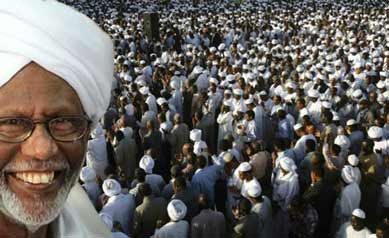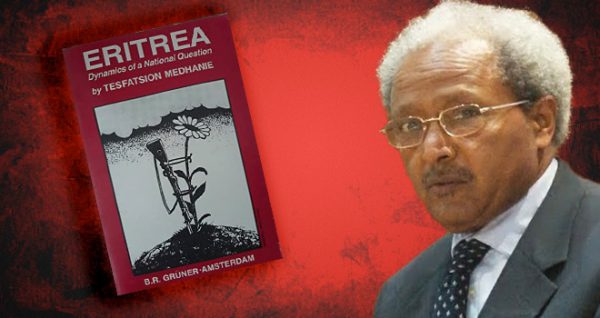PFDJ Understands Only Force
 Before I proceed to the main subject of this article, I would like to congratulate the Tunisian and Egyptian people for waging a successful revolutions and ousting the longtime dictators, thus being able to decide the future of their nations. The audacious popular uprising that emerged in Tunisia indeed inspired many Arab nations that suffered under cruel tyrants for decades. It defeated fear and silence and proved that dictators do not have the guts to face the courage and determination of the masses. The contagious anger and frustration of the Tunisian people reached Egypt and spread further towards Yemen, Bahrain, Libya, Jordan, Iraq, Mauritania and Azerbaijan. Who knows, we might even witness a the collapse of more unjust rulers in the near future somewhere else!
Before I proceed to the main subject of this article, I would like to congratulate the Tunisian and Egyptian people for waging a successful revolutions and ousting the longtime dictators, thus being able to decide the future of their nations. The audacious popular uprising that emerged in Tunisia indeed inspired many Arab nations that suffered under cruel tyrants for decades. It defeated fear and silence and proved that dictators do not have the guts to face the courage and determination of the masses. The contagious anger and frustration of the Tunisian people reached Egypt and spread further towards Yemen, Bahrain, Libya, Jordan, Iraq, Mauritania and Azerbaijan. Who knows, we might even witness a the collapse of more unjust rulers in the near future somewhere else!
The recent swift turn of events that we noticed in Tunisia and Egypt had been unthought-of even in our wildest dreams. Was there anyone of us who thought one day Hosni Mubarak would be removed from office in just few days? These a relevant lessons for us; history is repeating itself.
The events are reminiscent of the revolutions of the 1950s and 60s, when many African people fought for independence and dignity from foreign imperialists. But now, unlike the revolutions of the 20th century, the enemy is domestic; and the tools are mainly facebook and twitter! We learned a lot about how the social network played a remarkable role in inspiring and organizing the youth of Tunisia and Egypt. We also observed that, under some circumstances, conscious and effective media campaign can be a much better way to fight tyranny than fighting it with guns or explosives.
In my neighborhood, I always initiate political debates among my Eritrean friends. Yet, the vast majority of them are so desperate and do not express their views whenever we raise matters directly linked to the politics of our nation. Most of our time is spent talking about the Internet and whether it can change the reality in Eritrea or not. I insist on following the optimistic approach and say: Yes We Can; if, and only if, we all contribute our respective resources to accomplish the goal of getting rid of the dictatorship. But they tend to be hopeless, or rather fearful, to speak out and condemn the PFDJ regime; they overwhelmingly believe that change should be affected from the inside through violence and that the cyber campaign is not effective.
However, after the surprising and dramatic collapse of the Tunisian and Egyptian regimes, the perception has changed; those who were belittling facebook and twitter are astonished about how information sharing and broad media coverage brought Bin Ali and Mubarak to their knees and made the dreams of the masses come true! The Tunisian Revolution became a model of freedom and dignity for the whole people of the world who live a miserable life under corrupt and inhumane leaders; we no more need to search for books of history and quote Gandhi or Martin Luther King, Bouazizi have already replaced them and reserved a noble page for himself in history.
Back to the point. Many writers have contributed articles about the type of resistance that we Eritreans should wage in order to overthrow Isaias and his clique. I will also say my part and try to emphasize more on the Eritrean reality.
To remove tyranny and establish a democratic state, there are numerous tested strategies that should be followed. Nowadays, Eritrean opposition groups are divided into two possible courses of action to achieve democracy: violent and non-violent resistance. Those who are advocating the peaceful resistance believe that civil disobedience and international pressure would remove the PFDJ regime, thereby, the results of this kind of strategy are desirable and safe from any foreign intervention or “conspiracy.” They believe that armed resistance is outdated and may lead to huge losses of life among the citizens of the nation, moreover, it doesn’t encourage the participation of the broader public. They believe that popular uprising and peaceful demonstration is an ideal mechanism to set a reliable democratic government after the removal of the PFDJ. Besides, those who are chanting the slogans of non-violent resistance also believe that “change” must emanate from the inside; any armed opposition based in the neighboring countries, particularly in Ethiopia is ” strictly forbidden.”
On the other hand, the proponents of the violent resistance emphasize that , the concept of non-violent resistance is a false ideal and it is difficult to practice in Eritrea. They stress that violence should not be ruled out, when no option is left; peaceful resistance presupposes the existence of compassion and a sense of justice on the part of ones’ adversary. If this adversary has everything to lose and nothing to gain by exercising justice and compassion, his reaction can only be negative. With regard to this attitude, there are conditions that obliges a particular opposition to use force and snatch its rights; Eritrea is a perfect example where the use of force is justified.
The supporters of the armed resistance also defend their strategy by presenting various credible evidences that took place in post-independent Eritrea. They say: had peaceful intervention been efective, it would have saved the lives of the Tegadelties who sought their rights in a civilized and peaceful manner in the early 1990s; it would have realized the demands of the G15, who fought alongside Isaias for more than three decades. Imagine: how do you think the regime would respond to civilian protesters? Nothing but brutality similar to what is happening in Libya, just like what Isaias’ crazy counterpart is doing.
Slight Comparative Analysis
Who is not be excited to see the collapse of old authoritarian regimes of North Africa? None, except PFDJ and their diehard Diaspora spies. The current peaceful political dynamics that are taking place in Tunisia, Egypt and Libya are founded on “relative democracy” and the political atmosphere for these developments to happen was partially suitable, if not in its entirely. They have traditional opposition movements (Muslim Brotherhood and Kifaya movement in Egypt, for instance) which were acting inside their respective nations and in the Diaspora. They have relative freedom of speech and press, and the right to organize themselves and convey their message to the public and international community—at least they have the right to be left alone and lead their private lives.
Before the fall of the dictatorship in Tunisia and Egypt, their traditional opposition movements have been struggling for so long to establish justice and freedom. Their voice was heard through different media outlets and they had recognition from the incumbent governments.
These countries did not have wars with their neighboring countries and that helped them to focus on their domestic affairs.
Now, do we enjoy a fraction of the above-mentioned rights in Eritrea so that we can launch a non-violent resistance? Are we conscious enough like the Arabs to have one voice and chant “Alsha’b Yurid, Isqat Alnizam“, the people want the downfall of the regime? Do we posses a united clear vision to uproot the PFDJ regime? Unfortunately, not yet. Nothing was achieved; let alone to remove the regime, we couldn’t even agree on the demands of our own people from the expected government.
If we contrast the agonies of the Tunisian and Egyptian people with our own, we find nothing to compare at all, we are deprived of basic right. Illiteracy, poverty, slave labor, systematic expulsion, insecurity, indoctrination, confusion, and many others worse injustices have become the only rewards that the PFDJ offers. Eritreans are the most oppressed peoples in Africa and if oppression alone is the cause for removing a dictatorship, we should be among the first peoples in the world to fight for their rights. However, the reality in Eritrea is not conducive for peaceful resistance; since its creation, the PFDJ never understood a civilized language; it always reacts violently. Its intelligence apparatus is very well experienced and has the ability to uncover plots before they are executed to hit a particular target. One of the secrets behind the survival of the PFDJ is that, it is always vigilant about the possibility of any political crisis and it plans anti-resistance actions for the future.
I believe that in today’s Eritrea, the idea of peaceful resistance is not practical; it will only serve and extend the life of the ruling regime.
How can we deal with a regime that disrespects its own people and denies the existence of legitimate opposition movements? How can you persuade the tyrant to listen to your demands when he tells you that you are not there? People should put in mind that the regime in Eritrea can not collapse through mere wishful thinking; we have to force and frighten the PFDJ until it recognizes that there is a popular demand for change. Otherwise, we will waste another twenty years preaching about unrealistic strategies. The late Dr. John Garang of Southern Sudan did not achieve peace through peaceful resistance; Justice and Equality Movement of Darfur was named as qutta’e alturuq, bandits by the Sudanese government before they took arms and obliged the government to RECOGNIZE and negotiate with them.



Awate Forum